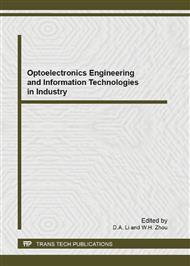[1]
Aleksandra Klasnja Milicevic, Alexandros Nanopoulos , Mirjana Ivanovic, Social tagging in recommender systems: a survey of the state-of-the-art and possible extensions, Artif Intell Rev (2010) 33: 187–209.
DOI: 10.1007/s10462-009-9153-2
Google Scholar
[2]
Scott Bateman, Christopher Brooks, Gordon McCalla, Peter Brusilovsky, Applying Collaborative Tagging to E-Learning, WWW 2007, May 8-12, 2007, Banff, Canada.
Google Scholar
[3]
Carsten Ullrich, Kerstin Borau, Heng Luo, Xiaohong Tan, Liping Shen, Ruimin Shen, Why web 2. 0 is good for learning and for research: principles and prototypes, WWW '08 Proceeding of the 17th international conference on World Wide Web.
DOI: 10.1145/1367497.1367593
Google Scholar
[4]
Xin Li, Lei Guo, Yihong Eric Zhao, Tag-based Social Interest Discovery, WWW2008.
Google Scholar
[5]
Vassileva, Julita, Toward social Learning Environments, IEEE RANSACTIONS ON LEARNING TECHNOLOGIES Vol. 1 No. 4 : 199-214, (2008).
Google Scholar
[6]
Christian Dalsgaard, Social software: E-learning beyond learning management systems, http: /www. eurodl. org/materials/contrib/2006/Christian_Dalsgaard. htm.
Google Scholar
[7]
Zhang, Xuemin , Research on personalized E-learning model, ISECS International Colloquium on Computing, Communication, Control, and Management, CCCM 2008, v 1, pp.635-637, (2008).
DOI: 10.1109/cccm.2008.391
Google Scholar
[8]
Teo, Chao Boon; Gay, Robert Kheng Leng, A knowledge-driven model to personalize e-learning, ACM Journal on Educational Resources in Computing, v 6, n 1, March 1, (2006).
Google Scholar
[9]
Yin, Chun-Yong; Luo, Qi, Personality mining system in E-learning by using improved association rules, Proceedings of the Sixth International Conference on Machine Learning and Cybernetics, ICMLC 2007, v 7, pp.4130-4134, (2007).
DOI: 10.1109/icmlc.2007.4370869
Google Scholar
[10]
Romero, Cristóbal; Ventura, Sebastián; García, Enrique, Data mining in course management systems: Moodle case study and tutorial, Computers and Education, v 51, n 1, pp.368-384, August (2008).
DOI: 10.1016/j.compedu.2007.05.016
Google Scholar
[11]
Keleberda, Igor; Repka, Victoria; Biletskiy, Yevgen, Semantic mining based on the learner's preferences, Canadian Conference on Electrical and Computer Engineering, pp.502-504, (2007).
DOI: 10.1109/ccece.2006.277467
Google Scholar
[12]
Pan, Jianguo; Zhang, Bofeng; Wang, Shufeng; Wu, Gengfeng, A personalized semantic search method for intelligent e-learning, The 2007 International Conference on Intelligent Pervasive Computing, IPC 2007, pp.11-14, (2007).
DOI: 10.1109/ipc.2007.48
Google Scholar
[13]
Zhuhadar, Leyla; Nasraoui, Olfa, Semantic information retrieval for personalized e-learning, International Conference on Tools with Artificial Intelligence, ICTAI, v 1, pp.364-368, (2008).
DOI: 10.1109/ictai.2008.130
Google Scholar


